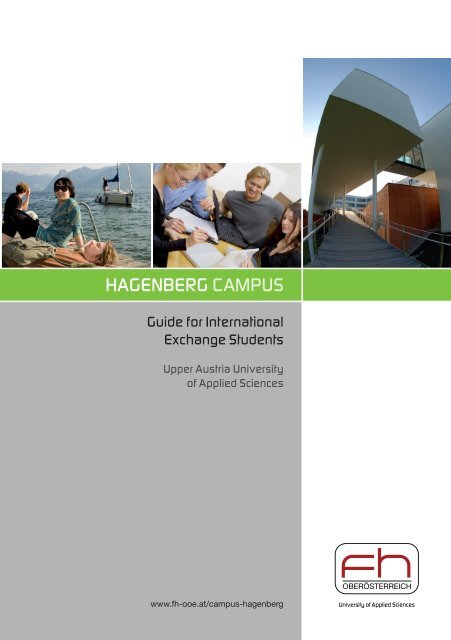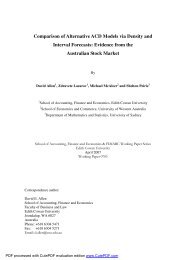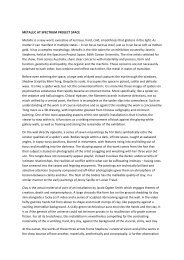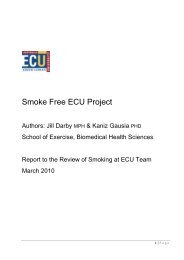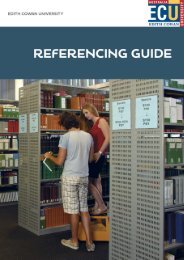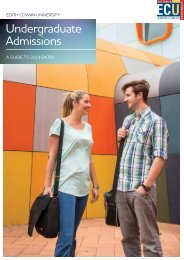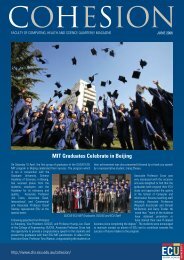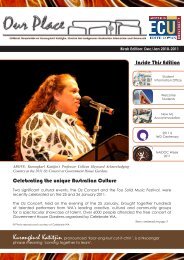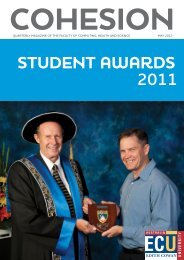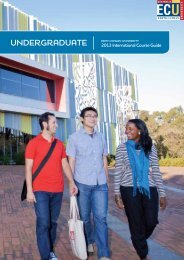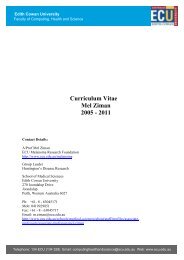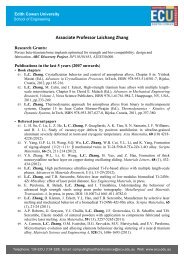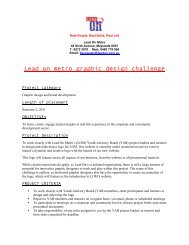Hagenberg campus exchange guide
Hagenberg campus exchange guide
Hagenberg campus exchange guide
Create successful ePaper yourself
Turn your PDF publications into a flip-book with our unique Google optimized e-Paper software.
HAGENBERG CAMPUS<br />
Guide for International<br />
Exchange Students<br />
Upper Austria University<br />
of Applied Sciences<br />
www.fh-ooe.at/<strong>campus</strong>-hagenberg
Guide for International Exchange Students<br />
Contents<br />
Life as an International Student in Austria<br />
General Information about <strong>Hagenberg</strong> .................................................................................................. 4<br />
Universities of Applied Sciences in Austria - <strong>Hagenberg</strong> Campus ....................................... 5<br />
Our Degree Programs<br />
Bachelor Programs:<br />
Bioinformatics ........................................................................................................................................ 6<br />
Communication and Knowledge Media ................................................................................................ 6<br />
Computer and Media Security ............................................................................................................... 6<br />
Hardware/Software Systems Engineering ............................................................................................. 6<br />
Media Technology and Design ............................................................................................................... 6<br />
Mobile Computing .................................................................................................................................. 6<br />
Software Engineering ............................................................................................................................. 6<br />
Masters Programs:<br />
Digital Media .......................................................................................................................................... 7<br />
Embedded Systems Design ................................................................................................................... 7<br />
Information and Engineering Management (part time) ........................................................................... 7<br />
Mobile Computing ................................................................................................................................. 7<br />
Secure Information Systems .................................................................................................................. 7<br />
Software Engineering ............................................................................................................................. 7<br />
Internationalisation<br />
International Office <strong>Hagenberg</strong> / Contact ............................................................................................... 8<br />
Arrival Dates ............................................................................................................................................ 8<br />
Grading System ...................................................................................................................................... 8<br />
ECTS ....................................................................................................................................................... 8<br />
<strong>Hagenberg</strong> Campus Services and Facilities<br />
Internet and Intranet / Student ID-Card / Library .................................................................................... 9<br />
Pick-up Service / Accommodation ......................................................................................................... 9<br />
Academic Information<br />
Academic Calendar / Types of Classes ................................................................................................ 10<br />
Attendance Policy / Examinations ........................................................................................................ 11<br />
<strong>Hagenberg</strong> Campus Events/Free time activities<br />
Sports & Leisure ................................................................................................................................... 12<br />
Do’s and Don’ts .................................................................................................................................... 13<br />
Essential Practical Information<br />
Survival German for Student Life .......................................................................................................... 14<br />
Registration with the local authorities ................................................................................................... 14<br />
Climate and Clothing ............................................................................................................................. 15<br />
Currency / Monthly Living Costs in <strong>Hagenberg</strong> .................................................................................... 15<br />
Banking Hours / Credit Cards ............................................................................................................... 15<br />
Medical Services and Pharmacies / Emergency Numbers .................................................................... 16<br />
Health Insurance Coverage / Non-emergency Medical Treatment ........................................................ 16<br />
Infrastructures ....................................................................................................................................... 17<br />
Public Transport - Railways/ Discount Rail Travel ................................................................................ 17<br />
Getting to <strong>Hagenberg</strong> ........................................................................................................................... 17<br />
HAGENBERG CAMPUS 2
Statements<br />
International Students in <strong>Hagenberg</strong><br />
I have no words to describe this experience,<br />
these months have been one of my best experiences.<br />
<strong>Hagenberg</strong> is a nice village, the people are<br />
quite friendly, and academically <strong>Hagenberg</strong> is a<br />
very recommendable place to study, I have learned<br />
so much. I miss the landscape, the Austrian<br />
food, the people… I will not forget <strong>Hagenberg</strong> in<br />
my life...<br />
3<br />
Oscar Conde O‘Donnell,<br />
University of Malaga, Spain<br />
I heard great things from some friends about<br />
<strong>Hagenberg</strong> before I came: studying, playing,<br />
partying - it‘s a cool place to study. They have<br />
professional equipment for the students to use,<br />
industry standard software and people who are<br />
there to help out at anytime.<br />
Shayna Quinn,<br />
Wanganui School of Design, NZ<br />
Nice people, great atmosphere – I really enjoyed<br />
my stay in <strong>Hagenberg</strong>.<br />
Sonja Chèvre,<br />
FH Bern, Switzerland<br />
<strong>Hagenberg</strong> is the best combination between<br />
fun and studying. There are a lot of great people<br />
ready to help you or to party with you.... If you<br />
want to have fun, you defi nitely need to come to<br />
<strong>Hagenberg</strong>! I will not forget this experience and<br />
neither will you!<br />
Popescu Cosmin Valentin,<br />
University Babes-Bolyai Cluj-Napoca, Romania<br />
I absolutely loved studying in <strong>Hagenberg</strong> and<br />
would highly recommend the Upper Austria<br />
University of Applied Sciences to any anyone<br />
considering studying there. The teachers and staff<br />
were both very friendly and professional and as<br />
an international student I instantly felt comfortable<br />
on <strong>campus</strong>. What I loved most about the school<br />
was the way that the native Austrian students<br />
really made an effort to make me part of other<br />
student events and activities and often helped to<br />
solve any problems I had.<br />
Johnson Witehira,<br />
Wanganui School of Design, NZ<br />
When I chose <strong>Hagenberg</strong> as my destination<br />
I didn‘t know I was going to one of the most<br />
beautiful landscapes just in the middle of Europe.<br />
It is on a great location as you can travel to<br />
many countries which are relatively close (Czech<br />
Republic, Germany, Poland...). They have a great<br />
College here with the newest technology and nice<br />
and helpful people.<br />
You will also fi nd a lot of student parties at the<br />
Fachhochschule or in Linz where you’ll meet<br />
really awesome people.<br />
For me the best thing from coming here was getting<br />
to know all the different cultures I had around:<br />
Polish, Turkish, Spanish (!), German, Romanian...<br />
and of course Austrian!<br />
Carlos Alonso Pena Osorio,<br />
University of Málaga, Spain<br />
<strong>Hagenberg</strong> is a very quiet and peaceful village<br />
where you can really focus on studying. The<br />
University is professionally equipped so new<br />
opportunities and challenges are available. But<br />
of course it‘s not only about studying - you can<br />
meet wonderful and friendly people here and<br />
learn something about their culture and beautiful<br />
country. I will never regret spending my time here!<br />
Wojciech Kaczmarek,<br />
Wroclaw University of Technology, Poland
Studying in Austria<br />
Life as an International Student<br />
in Austria<br />
Congratulations on your decision to embark on one of life’s great adventures: a period of residence and<br />
study abroad. We hope that your stay here will be a wonderful, unforgettable experience for you.<br />
International <strong>exchange</strong> students the world over usually experience different phases of adjustment during<br />
their stay abroad. At fi rst you will probably see everything through the eyes of a tourist. Everything is new<br />
and exotic. After this stage you get down to the business of living your everyday life, which for some<br />
people is accompanied by a sense of disorientation or culture shock. This is a quite natural phenomenon<br />
when someone is in completely unfamiliar surroundings where everything is new.<br />
If this affects you, please do not hesitate to speak to one of the staff involved in internationalisation. We<br />
have been through this ourselves and will be more than willing to listen and talk with you about it. You<br />
may also fi nd it helpful to bear in mind that this is a phase that will pass and in the meantime try to keep<br />
an open mind and seek contact with other people.<br />
General Information about <strong>Hagenberg</strong><br />
<strong>Hagenberg</strong> is an idyllic town in the beautiful<br />
Mühlviertel, in the heart of Upper Austria. In the<br />
last decade, <strong>Hagenberg</strong> has established itself as<br />
an internationally recognized center for computing<br />
and software development. Several high-tech<br />
companies and research centers have chosen to<br />
settle in the Software Park in <strong>Hagenberg</strong>.<br />
An outstanding mix of the most modern technology<br />
combined with the picturesque setting of<br />
the <strong>Hagenberg</strong> castle gives the town its unique<br />
fl air. Located just 20km north of Linz, <strong>Hagenberg</strong><br />
offers focused degree programs in the fi eld of<br />
Information Technology away from the bustle of<br />
the big city, yet with easy access to the resources<br />
of the provincial capital.<br />
The University of Applied Sciences is housed in a<br />
futuristic building equipped with the most modern<br />
technology. More than 1300 students are currently<br />
attending the <strong>campus</strong> in <strong>Hagenberg</strong> to complete<br />
a degree in the fi elds of Information Technology<br />
and Media.<br />
HAGENBERG CAMPUS 4
Studying in Austria<br />
Universities of Applied Sciences<br />
in Austria<br />
Universities of Applied Sciences – in German “Fachhochschulen” (FH) – are relatively new in Austria: the<br />
law authorizing their introduction was passed in the early 90s and the fi rst degree programs were launched<br />
in autumn 1994. Currently over 100 different degree programs are offered at Universities of Applied<br />
Sciences in Austria. The aim of Austria’s Universities of Applied Sciences is to provide a more practiceoriented<br />
education to complement the range of courses offered by traditional universities. Education is<br />
founded on academic, research-based principles; Universities of Applied Sciences are required to carry<br />
out applied research and development, which are integrated into the curricula. Students are involved in<br />
R&D projects at an early stage of their studies.<br />
Keeping in line with the Bologna Declaration, however, the transition to the bachelor/master system at the<br />
Upper Austria University of Applied Sciences has already been completed in nearly all degree programs.<br />
The transition does not only serve to improve international comparability and recognition, but also leads<br />
to a greater degree of fl exibility for the students.<br />
<strong>Hagenberg</strong> Campus<br />
The academic programs in <strong>Hagenberg</strong> are divided<br />
into three main fi elds:<br />
>> Software, Systems and Media<br />
Each program has a clearly defi ned and industryoriented<br />
focus. These focuses include such areas<br />
as software development, hardware and software<br />
interfaces, applications in the fi eld of mobile<br />
devices and security-related aspects of modern<br />
communication, in addition to the technical, organizational,<br />
and design-related issues in the fi eld<br />
of media. Courses in business administration and<br />
project management complement the curricula,<br />
resulting in graduates who are highly qualifi ed for<br />
leading positions within the IT and media industry.<br />
5<br />
The Structure of our Degree Programs<br />
The Bachelor Programs (three years, 180 ECTS)<br />
require a one term professional internship during<br />
which students work in companies or research institutes<br />
in Austria or abroad. Training in soft skills<br />
is an additional feature of our programs.<br />
The Masters Programs (two years, 120 ECTS)<br />
offer in-depth specialization in specifi c fi elds with<br />
emphasis on strategic thinking and problemsolving<br />
skills.
<strong>Hagenberg</strong> Campus<br />
Our Degree Programs<br />
Bachelor Programs:<br />
Bioinformatics<br />
This undergraduate degree program offers a modern and industry-oriented education in the fi elds of<br />
software development, database technologies, 3D modeling/simulation of biological processes and a<br />
basic understanding of processes in the fi elds of biology, genetics and biopharmacy.<br />
Communication and Knowledge Media<br />
This undergraduate program teaches the design and use of media in corporate communication,<br />
computer-enhanced learning, and knowledge management. Graduates plan the use of media in processes<br />
of information, communication, learning, knowledge, creation and work and are responsible<br />
for quality management concerning the effective use of media in these processes.<br />
Computer and Media Security<br />
The undergraduate degree program Computer and Media Security provides an education in all forms<br />
of security measures in connection with the organization and operation of computer systems and<br />
networks as well as the transfer, storage and archiving of electronic data.<br />
Hardware/Software Systems Engineering<br />
Graduates of this degree program are highly skilled in the computer-aided design of integrated VLSI<br />
circuits, in applying microcontrollers and peripherals, in writing effi cient software, and in optimizing<br />
systems as a whole. A further focus in this program is the knowledge in electronics, computer architecture,<br />
communications engineering and software development.<br />
Media Technology and Design<br />
Achieving the perfect combination of the latest technology, content and design is essential for success<br />
in the fi eld of digital media. This program provides students with the technical expertise, design<br />
knowledge and communication skills to face this challenge. A solid education and experience with<br />
professional equipment enable students to realize innovative concepts.<br />
Mobile Computing<br />
The goal of the undergraduate program Mobile Computing is to educate people who, equipped with<br />
substantial knowledge in the fi elds of communications technology, informatics and application development,<br />
can professionally manage projects in this future technology both technically and organizationally.<br />
Software Engineering<br />
In this undergraduate program students are trained to recognize, analyze, model, implement or improve<br />
business and technical processes in terms of appropriate software. The aim is to enable them<br />
to develop software with the most modern methods of software technology for all areas of application.<br />
HAGENBERG CAMPUS 6
Masters Programs:<br />
7<br />
Digital Media<br />
The Masters program Digital Media allows students to apply an individual focus to their studies of<br />
media technology and design. In addition to obtaining an education on a professional level, students<br />
are encouraged to develop their capacity for independent work, perfect their methodology, and hone<br />
their communication skills.<br />
Embedded Systems Design<br />
This Masters Program is an interdisciplinary educational and research program which covers all<br />
aspects of embedded systems. Embedded systems are ubiquitous in daily life, covering for instance<br />
products such as handheld devices, medical devices and automobiles. They combine hard and<br />
software in real-time applications. The complexity of such a system requires skills in system design,<br />
verifi cation and simulation in addition to embedded software development, communication engineering<br />
and VLSI chip-design.<br />
Information and Engineering Management (part time)<br />
The goal of this Masters program is to give graduates of typical information technology studies –<br />
especially those in software engineering, informatics, etc. – the opportunity to further develop themselves<br />
in the area of IT management (Department Head of EDP, IT Manager, CIO, etc.), with particular<br />
emphasis placed on the new circumstances inherent in such positions of management.<br />
Mobile Computing<br />
The Masters program “Mobile Computing” offers the opportunity to specialize in different areas<br />
dealing with software development for mobile applications. Key aspects of the education are the guidance<br />
towards a systematic approach to problem solving, an autonomous working style, and further<br />
training of social skills.<br />
Secure Information Systems<br />
This program offers a chance for individual in-depth studies and specialization in varied areas of IT<br />
security. Its main focus is on practical training as well as independent and systematic work with an<br />
emphasis on the development of communication skills. The modules Computer & Network Forensics,<br />
Cryptography, Advanced Networking and Law & Experts can be combined individually.<br />
Software Engineering<br />
The Masters program Software Engineering offers students a profound and modern education in all<br />
aspects relevant to complex software systems (e.g. architecture, security, and fault tolerance) and to<br />
the main instances of such systems (e.g. heterogeneous, distributed, and mobile).
<strong>Hagenberg</strong> Campus<br />
Internationalisation<br />
The International Offi ce is in charge of international<br />
relations within our <strong>Hagenberg</strong> Campus.<br />
The Upper Austria University of Applied Sciences<br />
maintains contacts to partner universities on<br />
almost all continents. Our International Offi ce<br />
facilitates <strong>exchange</strong>s of students and academic<br />
staff.<br />
Internationalisation is changing the face of business<br />
today and must therefore play an integral<br />
role in the education of future business people.<br />
<strong>Hagenberg</strong> Campus therefore has a fi rm commitment<br />
to providing its students with opportunities<br />
to broaden their horizons on an international level,<br />
not least by encouraging them to complete part<br />
of their studies abroad, either at a partner institution<br />
or by doing their internships abroad.<br />
In addition to this, courses in various foreign<br />
languages and cultures taught almost exclusively<br />
by native speakers, frequent international<br />
faculty <strong>exchange</strong>s, and the increasing number of<br />
courses in other subjects held in English, encourage<br />
students to accept English as a language<br />
of everyday communication while gaining insight<br />
into different cultures.<br />
The presence of foreign <strong>exchange</strong> students also<br />
makes an important contribution to the internationalisation<br />
of the <strong>campus</strong> environment and<br />
students are encouraged to benefi t from this to<br />
the full by taking part in the Buddy System and<br />
generally seeking contact with students from<br />
other cultures.<br />
Contact<br />
>> International Offi ce <strong>Hagenberg</strong><br />
Christina Huber-Beran<br />
Head of the International Offi ce<br />
Phone: +43 (0)7236 3888-1601<br />
Fax: +43 (0)7236 3888-2199<br />
christina.huber-beran@fh-hagenberg.at<br />
Arrival Dates<br />
Exact arrival dates for specifi c semesters can be<br />
found on the incoming students’ pages of our<br />
website and are also given in the welcome letter<br />
that we send to students whose applications have<br />
been accepted.<br />
Grading System and ECTS<br />
The Austrian education system works with 5<br />
grades:<br />
Austrian Grade Equivalent<br />
sehr gut (1) excellent<br />
gut (2) very good<br />
befriedigend (3) satisfactory<br />
genügend (4) sufficient<br />
nicht genügend (5) fail<br />
Usually 50% of available points have to be obtained<br />
to pass an exam, but professors can define<br />
their own assessment criteria.<br />
ECTS<br />
ECTS (“European Credit Transfer System”)<br />
credits are a numerical value (between 1 and 60)<br />
allocated to course units to denote the student<br />
workload required to complete them. They refl ect<br />
a quantity of work required by each course unit<br />
in relation to the total quantity of work necessary<br />
to complete a full year of academic study at the<br />
institution that includes, lectures, practical work,<br />
seminars, tutorials, fi eldwork and private study as<br />
well as assessment activities. The ECTS is thus<br />
based on a full student workload and not limited<br />
to contact hours only. The basic allocation of academic<br />
credits in ECTS is 60 credits for a full year<br />
of study, 30 credits for a semester, or 20 credits<br />
per term.<br />
Credits are awarded only when the course has<br />
been completed and all required examinations<br />
have been passed. In other words, students do<br />
not get ECTS credits simply for attending classes<br />
or spending time abroad, but must fulfi l the<br />
assessment requirements of the host institution<br />
to demonstrate that they satisfy the specifi ed<br />
learning objectives for the course unit.<br />
HAGENBERG CAMPUS 8
<strong>Hagenberg</strong> Campus<br />
Services and Facilities<br />
Internet and Intranet<br />
Students have unlimited free access to the Internet<br />
from numerous computers throughout the<br />
University building. Every student is also linked to<br />
the intranet and given a personal e-mail account.<br />
Student ID Card<br />
At the secretary´s offi ce, you will get your student<br />
ID card which contains your student number. The<br />
ID card also works as a key to the rooms where<br />
students have free access.<br />
These are: student working rooms, the computer<br />
labs as well as other labs in which you might be<br />
working throughout the semester.<br />
IT information<br />
Login Procedure<br />
Before you can log in for the fi rst time, you need<br />
to register with the <strong>campus</strong> IT system. After registration<br />
you will receive your student ID.<br />
In order to log in to your personal account, you<br />
have to enter a user name and a password.<br />
Web Mail System<br />
Each student is provided with a defi ned e-mail<br />
address. It is a combination of your registration<br />
number and “@fh-hagenberg.at”.<br />
In order to log in to the web mail system, you<br />
have to start the browser fi rst and then link to<br />
http://webmail.fh-hagenberg.at.<br />
Pick-up Service<br />
Students who arrive by train or airplane can be<br />
picked up by our students.<br />
9<br />
Library<br />
All students will be issued student ID cards enabling<br />
them to withdraw books from the library at<br />
<strong>Hagenberg</strong> Campus. Further information on the<br />
use of the library will be provided during the fi rst<br />
days in <strong>Hagenberg</strong>.<br />
Accommodation<br />
Student housing is available nearby, ranging from<br />
on-<strong>campus</strong> halls of residence to private on-<strong>campus</strong><br />
as well as off-<strong>campus</strong> accommodation. If you<br />
would like assistance arranging accommodation<br />
please contact the International Offi ce (the accommodation<br />
form can be downloaded from our<br />
website). More information about the student hall<br />
of residence is available at www.studentenwerk.<br />
at. There you will fi nd information about current<br />
rates and facilities. Please note that a security deposit<br />
in the amount of the monthly rent has to be<br />
paid in advance. The fi rst month‘s rate will have<br />
to be paid within the fi rst days after arrival!<br />
There are also private rooms and apartments<br />
available for rent in <strong>Hagenberg</strong> and the surrounding<br />
area. For more information contact the<br />
municipality:<br />
>> Marktgemeinde <strong>Hagenberg</strong><br />
A-4232 <strong>Hagenberg</strong>, Kirchenplatz 5a<br />
Phone: +43 7236 2318, Fax: +43 7236 2318-3<br />
gemeinde@hagenberg.ooe.gv.at<br />
www.oberoesterreich.at/hagenberg
<strong>Hagenberg</strong> Campus<br />
Academic Information<br />
Although the primary language of instruction at <strong>Hagenberg</strong> Campus is German, as part of our commitment<br />
to internationalisation an increasing number of courses are offered in English. Courses in German<br />
are available to foreign <strong>exchange</strong> students with suffi cient command of the German language. A catalogue<br />
of courses currently taught in English is available on request.<br />
Academic Calendar<br />
<strong>Hagenberg</strong> Campus has an academic year<br />
divided into two semesters.<br />
>> Fall Semester:<br />
Beginning of October to the middle of<br />
February<br />
>> Spring Semester:<br />
Beginning of March to the middle of July<br />
>> Examination period:<br />
End of January to Mid-February (Fall<br />
Semester)<br />
End of June to Mid-July (Spring Semester)<br />
>> Breaks:<br />
Christmas (2 weeks), February (1 to 4 weeks),<br />
Easter (1 week), Summer holidays in July/<br />
August/September (12 weeks).<br />
January 1 New Years Day – Neujahrstag<br />
January 6 Epiphany – Hl. Drei Könige<br />
May 1 Labor Day – Tag der Arbeit<br />
October 26 Austrian National Holiday –<br />
Nationalfeiertag<br />
November 1 All Saints’ Day - Allerheiligen<br />
December 8 Immaculate Conception –<br />
Maria Empfängnis<br />
>> The following church holidays are also public<br />
holidays in Austria:<br />
Ascension Day Christi Himmelfahrt<br />
Whitsuntide Pfingsten<br />
Corpus Christi Fronleichnam<br />
Assumption Maria Himmelfahrt<br />
Easter Monday Ostermontag<br />
Types of Classes<br />
While some subjects are presented as traditional<br />
lectures, others are taught in the form of seminars,<br />
project work and skills practice or a combination<br />
of these methods<br />
Seminars and Workshops<br />
These are classes in which students research<br />
topics and present and discuss them within a<br />
relatively small group. These can, in some cases,<br />
augment project work.<br />
Block Instruction<br />
In some cases – primarily in the case of seminars<br />
and workshops – instruction does not take place<br />
weekly, but is instead delivered in blocks of more<br />
intensive instruction (e.g. one block every two<br />
weeks or even one block per term). Blocks can<br />
also be held as immersion courses on weekends.<br />
Excursions<br />
Some courses occasionally include excursions,<br />
and attendance is generally obligatory. Any costs<br />
that arise for entrance fees, accommodation or<br />
other expenses are paid by the students.<br />
Project Work<br />
These are not theoretical projects but “real” work<br />
– with all the responsibilities that go along with<br />
it and have therefore proven popular with our<br />
<strong>exchange</strong> students in recent semesters.<br />
HAGENBERG CAMPUS 10
Students are supervised and <strong>guide</strong>d by a faculty<br />
member but most of the time they work on their<br />
own. Finally, the teams have to present their<br />
results to both their supervising faculty member<br />
and the company.<br />
The main aim of these projects is to train the<br />
students in teamwork. Teamwork and team spirit<br />
are key elements of our University’s philosophy<br />
– students learn to work together rather than<br />
competing with one another.<br />
Attendance Policy<br />
Students are expected to attend and participate<br />
fully in all lectures, seminars and projects in which<br />
they have elected to take part. Attendance lists<br />
may be kept at the discretion of the individual<br />
faculty members.<br />
The examination period is from the end of January<br />
to mid February in the fall semester and from<br />
the end of June to mid July in the spring semester.<br />
Students will be informed of the date, place<br />
and time of examinations, and given details of the<br />
examination procedure by the course instructor in<br />
due course.<br />
The lectures are assessed by a fi nal course examination.<br />
A number of individual exams are also<br />
permissible should the didactic concept render<br />
11<br />
this possible. The academic achievement for<br />
tutorials, seminars, projects, integrated courses,<br />
laboratory and behaviour training is usually subject<br />
to continuous assessment during the course<br />
(course immanent examination).<br />
Examinations<br />
In general, registration for a course at the beginning<br />
of term counts as registration for the examination.<br />
The only exceptions are changes made<br />
to the Learning Agreement within the prescribed<br />
period. To complete a term successfully, students<br />
must be examined for every course they have<br />
attended. Examinations may take various forms:<br />
formal written or oral examinations, assessment<br />
of coursework, a combination of the two or other<br />
means such as presentations during seminars,<br />
etc.<br />
Students are expected to be present to sit exams<br />
here in <strong>Hagenberg</strong>. However, in exceptional<br />
cases (e.g. clashing semester dates between<br />
home university and <strong>Hagenberg</strong>, urgent appointments,<br />
illness), when a student needs to leave<br />
<strong>Hagenberg</strong> Campus earlier, it is possible to take<br />
an exam by fax. However, this solution is not the<br />
norm and if there is such a necessity, we need to<br />
have confi rmation of it from the student’s home<br />
university or employer. Moreover, all details have<br />
to be discussed with the respective professor<br />
here in <strong>Hagenberg</strong> before leaving.
<strong>Hagenberg</strong> Campus<br />
Events/Free Time Activities<br />
<strong>Hagenberg</strong> Campus organises a varied program of events ranging from the legendary “Summer Fest”, the<br />
“Bierkistenrennen” (beer race) or the “<strong>Hagenberg</strong> Highland Games” and to more formal events such as<br />
the “Study Abroad Fair” (incoming students have the opportunity to present their home universities) and<br />
“<strong>Hagenberg</strong> Campus Ball” in the fall semester to which formal evening dress must be worn. Staff versus<br />
students soccer matches are also very popular on our <strong>campus</strong>!<br />
Sports & Leisure<br />
Of course there’s more to student life in <strong>Hagenberg</strong><br />
than just studying – there are plenty of leisure<br />
time activities to pursue here as well. Movie<br />
nights and student parties regularly take place on<br />
<strong>campus</strong>.<br />
Especially those interested in sports can fi nd a<br />
variety of suitable facilities in <strong>Hagenberg</strong>. - You<br />
can register at the FH-Sports Club (FH-Sportverein)<br />
which offers the following sports activities:<br />
Dance, Football, Ultimate Frisbee, Volleyball,<br />
Basketball, Climbing, Fitness Center, Running,<br />
Kickboxing and Back-strengthening Exercises.<br />
Registration for the Sports Club is possible<br />
during the fi rst two weeks of each semester. More<br />
information about registration and prices can be<br />
obtained from the FH-Sports Club at<br />
>> www.fh-ooe.at/sportverein.<br />
In the winter, the mountains offer wonderful<br />
slopes for skiing and snowboarding in the Mühlviertel<br />
as well as in the south of Upper Austria<br />
(Salzkammergut) and in the neighbouring provinces<br />
Salzburg and Styria. In the fall semester we<br />
usually organize a skiing day with our <strong>exchange</strong><br />
students.<br />
There are bus connections to Linz, the capital of<br />
Upper Austria, on a daily basis. A bus trip to Linz<br />
takes about 40 minutes, by car it only takes about<br />
20 minutes. There are a number of museums and<br />
other cultural landmarks in Linz, which will be the<br />
offi cial European Cultural Capital in 2009.<br />
HAGENBERG CAMPUS 12
Living in Austria<br />
Do´s and Don´ts<br />
Austria is a German speaking country. The current<br />
students’ generation is the fi rst that received a<br />
good general education in English from primary<br />
school onwards. However, many of the older<br />
people don’t speak any foreign languages. In tourist<br />
areas many people do in fact speak English<br />
but elsewhere most shop assistants and waiters<br />
speak very little English if any. Especially the older<br />
generation may consider it arrogant to expect<br />
everyone to speak English. Showing respect for<br />
Austrian culture by learning a few key words of<br />
German can help make everyday communication<br />
run more smoothly.<br />
13<br />
“Bitte” please<br />
“Danke” thank you<br />
“Entschuldigung” excuse me /<br />
pardon me<br />
“Guten Morgen” good morning<br />
“Grüss Gott” hello (formal)<br />
“Guten Abend” good evening<br />
“Auf Wiedersehen” goodbye<br />
When entering shops, especially smaller ones,<br />
but even larger ones, greet the salesperson. A<br />
“Grüss Gott” is simply expected of well-mannered<br />
persons. This even applies to outdoor markets.<br />
In Austria it is traditional that academic degrees<br />
and some professional qualifi cations are used as<br />
titles. Especially in academic environments many<br />
Austrians are quite sensitive about this and feel<br />
insulted if not addressed by their titles. Although<br />
many of the academic staff at <strong>Hagenberg</strong> Campus<br />
prefer to be addressed simply as “Herr A” or<br />
“Frau X”, this is not the norm. Whenever you are<br />
in a company, doing some project work however,<br />
always pay attention to the company culture.<br />
When in doubt, it is always better to use the title<br />
than to omit it. If it is not common in the company<br />
to use titles you will be told so. Whenever talking<br />
to staff of a traditional university never forget to<br />
use their title.<br />
Austrians usually take their shoes off as soon as<br />
they enter someone’s home. Most of the time the<br />
host responds by telling you not to do so; it is<br />
however better to take them off nevertheless as<br />
the host’s request to leave them on might be just<br />
politeness. If other guests are present the easiest<br />
way is to do as they do to get it right.<br />
Austrian waiters generally expect tips. This applies<br />
not only in restaurants but also in cafés and<br />
pubs. It is not customary to leave the tip on the<br />
table when leaving but to inform the waiter when<br />
paying what he should keep. For example, if the<br />
bill comes to € 9.20, you should round it up and<br />
tell him “make it 10”. In good restaurants Austrians<br />
tip 10% for particularly good service.<br />
When invited to someone’s home for a party or<br />
a meal it is always wise to bring along a little<br />
present. Austrians usually bring along a bottle of<br />
wine, sweets, fl owers, etc.<br />
Never take purchases you have made elsewhere<br />
into shops selling similar products in Austria. You<br />
may be asked to show the contents of your shopping<br />
bag or backpack at the checkout and it can<br />
lead to diffi culties if you have products in your<br />
bag that are also sold in the shop concerned.<br />
Many large stores provide lockers in which you<br />
can leave your shopping before you enter.<br />
Under Austrian law it is compulsory to separate<br />
your rubbish for recycling. Special bins are provided<br />
for glass, metal, plastic packaging, organic<br />
waste, recyclable paper and remaining non-recyclable<br />
waste. Additionally, all packaging materials<br />
have to be washed before being thrown away.<br />
In order to maintain a harmonious relationship<br />
with your neighbours, landlord and even to avoid<br />
problems with the authorities, it is important that<br />
you comply with this law.
Living in Austria<br />
Essential Practical Information<br />
Survival German for Student Life<br />
This short glossary of German terms related to life<br />
at <strong>Hagenberg</strong> Campus should help you in your<br />
orientation as a student here.<br />
Bibliothek library<br />
Endnote final mark / grade<br />
Fachbereich academic department<br />
Fachbereichsleiter head of department<br />
HBL full-time professor<br />
Hörsaal (HS) lecture hall<br />
IF student union at<br />
<strong>Hagenberg</strong> Campus<br />
IT / EDV Raum IT room (computer<br />
room)<br />
Jahrgangssprecher student representative<br />
of each course and year<br />
Klausur written examination<br />
Labor laboratory (room)<br />
Laborübung laboratory (class)<br />
Lehrveranstaltung<br />
(LVA)<br />
course<br />
Mensa university cafeteria<br />
Mündliche Prüfung oral examination<br />
NBL part-time lecturer<br />
Note mark / grade<br />
Prüfung examination<br />
Sekretariat administrative<br />
assistant’s offi ce<br />
Seminarraum (SR) seminar room<br />
Standortsprecher student representative<br />
of <strong>Hagenberg</strong> Campus<br />
Studiengang academic program<br />
Studiengangsleiter head of studies<br />
Stundenplan timetable<br />
Studienplan learning agreement<br />
Übung practice class<br />
Vorlesung (VL/VO) lecture<br />
Registration with the local authorities<br />
EU Citizens:<br />
For students from EU countries and Switzerland,<br />
a valid passport is suffi cient.<br />
Non-EU Citizens:<br />
Non-EU citizens have to contact the local Austrian<br />
Consulate/Embassy in their home country<br />
for details regarding current visa regulations for<br />
Austria. In order to enter Austria and to live here,<br />
you have to apply for a residence permit. The<br />
following documents are required:<br />
>> Passport (has to be valid for at least one more<br />
year)<br />
>> Certifi cate of Birth<br />
>> Letter of Confi rmation issued by the university<br />
>> Proof of health insurance coverage (confi rmation<br />
of registration with the Upper Austrian<br />
Health Insurance Company (OÖGKK)<br />
>> Bank statement (Austrian bank account<br />
required)<br />
>> Police clearance certifi cate<br />
>> 1 Passport-sized photo<br />
Please note that the residence permit is NOT a<br />
work permit for Austria. The Letter of Confi rmation<br />
for the embassy will be sent to you by the<br />
International Offi ce.<br />
Under Austrian law all changes of address have<br />
to be registered with the local authority within<br />
three working days; of course this also applies<br />
to foreign <strong>exchange</strong> students. In order to register<br />
you will need to take your passport (with a valid<br />
visa if applicable) and an offi cial registration form,<br />
“Meldezettel” which will be distributed and fi lled<br />
in directly at your arrival at the dormitory.<br />
After registration you will be given an offi cial<br />
print-out of your registration details which should<br />
be kept safely and will be needed along with<br />
a second “Meldezettel” when registering your<br />
departure.<br />
HAGENBERG CAMPUS 14
15<br />
“Anmeldebescheinigung“<br />
– Confirmation of Registration<br />
(For Nationals of EU/EEA countries only!)<br />
If you are staying in Austria for longer than 3<br />
months you have to register with the competent<br />
municipal authority (Bezirkshauptmannschaft<br />
Freistadt) within the fi rst 3 months of<br />
your stay and you will receive a confi rmation<br />
of registration.<br />
This registration is necessary in addition to<br />
the registration according to the registration<br />
act (Meldezettel). In case of non-compliance<br />
with this regulation a fi ne may be imposed.<br />
The International Offi ce will assist international<br />
students in this registration process.<br />
Climate and Clothing<br />
Austria gets very cold in the winter with temperatures<br />
sometimes dropping below -10˚C, so<br />
we recommend that you bring warm clothes<br />
and shoes with good sturdy soles for the winter<br />
semester. However, although you may associate<br />
Austria with winter sports, we often enjoy warm<br />
summers with temperatures sometimes up to and<br />
even above 30˚ C.<br />
Currency<br />
Since the beginning of 2002, Austria’s currency<br />
has been the Euro (€). 1 Euro = 100 cents<br />
Monthly Living Costs in <strong>Hagenberg</strong><br />
A student needs about € 400-560 per month.<br />
For example:<br />
Rent (inclusive) ........................... € 170 - 280<br />
Food .................................................... € 155<br />
Entertainment ....................................... € 75<br />
Other expenses .................................... € 40<br />
Total € 495 - 555<br />
Typical Prices of Everyday Products<br />
1 liter milk .......................................... € 1.00<br />
1 loaf of bread .................................... € 1.80<br />
100 g cheese ...................................... € 1.20<br />
1 yoghurt ............................................ € 0.50<br />
½ liter beer (supermarket) .................. € 0.80<br />
150 g ham .......................................... € 1.30<br />
1 kg apples ........................................ € 1.80<br />
1 liter of orange juice .......................... € 1.00<br />
500 g pasta ......................................... € 1.00<br />
375 g cereal ....................................... € 2.20<br />
Banking Hours<br />
Banking hours in Austria vary, but as a general<br />
rule banks open between 8:00 and 16:30 Monday<br />
to Friday and often close for one or two hours<br />
at lunchtime. Many banks also close on Friday<br />
afternoons.<br />
You will need to check the exact opening hours<br />
of the bank of your choice, as the above is just a<br />
general <strong>guide</strong>line.<br />
Student accounts usually are free in Austria, for<br />
opening an account you will need your passport<br />
and a confi rmation from our university.<br />
Credit Cards<br />
An increasing number of businesses in Austria accept<br />
major international credit cards such as Visa<br />
and Mastercard, although many companies only<br />
accept these for purchases above a certain price.
© Photos: OÖ.Tourismus,<br />
www.bilderbox.com,<br />
Upper Austria University of<br />
Applied Sciences,<br />
Michael Frühmann,<br />
Andrea Groisböck<br />
Medical Services and Pharmacies<br />
Austria boasts an excellent network of pharmacies<br />
and medical practitioners. Pharmacies<br />
operate a rota system for night and Sunday duty.<br />
When a pharmacy is closed a notice is displayed<br />
giving details of the nearest pharmacies that are<br />
open.<br />
Emergency Numbers<br />
Ambulance (Rettung) /<br />
Emergency Doctor (Notarzt): ....... Phone 144<br />
Fire Brigade (Feuerwehr): ............ Phone 122<br />
Police (Polizei/Gendarmerie): ...... Phone 133<br />
Mountain rescue service<br />
(Bergrettung): ............................... Phone 140<br />
Information on local medical emergency services<br />
is available from local police stations as well as in<br />
telephone directories and daily newspapers.<br />
Health Insurance Coverage<br />
Austria has an excellent public health care system.<br />
If you are staying in Austria for less than one<br />
year, you should fi nd out if there is an agreement<br />
between your home country and Austria regarding<br />
health insurance. Between EU countries there is<br />
reciprocal health insurance system. You need to<br />
bring a proof of health insurance coverage of your<br />
own insurance company or your health insurance<br />
card before coming to Austria in order to ensure<br />
that you will be treated in Austria in the event of<br />
any illness without having to pay anything yourself.<br />
At any event, international <strong>exchange</strong> students<br />
who are non-EU citizens must obtain full health<br />
insurance in Austria with the Upper Austrian<br />
Health Insurance Company (OÖGKK) for a fee of<br />
currently € 22.29 per month. Students can insure<br />
themselves for as long (or as short) as necessary.<br />
To register for insurance with OÖGKK you need<br />
the following:<br />
>> Confi rmation of enrolment at <strong>Hagenberg</strong><br />
Campus (Inskriptionsbestätigung)<br />
>> your Residence Registration („Meldezettel“)<br />
>> proof of health insurance coverage in your<br />
home country during the last 12 months<br />
The insurance covers hospital stays, medical<br />
attention and service all free of charge (with a<br />
medical insurance record card available at the<br />
OÖGKK), reduced prescription charges of currently<br />
€ 4.70 each.<br />
Non-emergency Medical Treatment<br />
If you need non-emergency medical treatment<br />
and are from an EU country that has a reciprocal<br />
health insurance agreement with Austria, you<br />
must take your passport and a proof of health insurance<br />
coverage of your own insurance company<br />
or your health insurance card from your home<br />
country to the general medical practitioner or the<br />
medical specialist whom you like to see. These<br />
documents entitle you to receive most medical<br />
treatment free of charge from doctors that have a<br />
contract with this regional public health insurance<br />
organisation. Such doctors usually advertise with<br />
the words “alle Kassen” on the wall plates outside<br />
their offi ces and it is to them that you should go<br />
for non-emergency medical treatment during<br />
consulting hours.<br />
If you are from a country that does not have such<br />
a reciprocal health care agreement with Austria,<br />
you must take your passport and your health<br />
insurance card (e-card) to the general medical<br />
practitioner or the medical specialist whom you<br />
like to see. After your registration with the Upper<br />
Austrian Health Insurance Company (OÖGKK<br />
in Pregarten, near <strong>Hagenberg</strong>) it usually takes 2<br />
weeks until you receive your e-card, in case of<br />
medical attention is required before you have got<br />
your e-card, use the confi rmation of registration<br />
(Meldezettel) as a substitute for the e-card.<br />
HAGENBERG CAMPUS 16
Important Vocabulary<br />
17<br />
Praktischer Arzt general medical practitioner<br />
Facharzt medical specialist<br />
Zahnarzt dental surgeon<br />
Frauenarzt gynaecologist<br />
Augenarzt eye specialist<br />
Urologe urologist<br />
HNO Arzt ear, nose and throat<br />
specialist<br />
Ordination medical practice<br />
Sprechstunden consulting hours<br />
Termin appointment<br />
Nach Vereinbarung by appointment<br />
Schmerzen pains<br />
Behandlung treatment<br />
Rezept prescription<br />
Apotheke pharmacy<br />
Infrastructure<br />
Post Offi ce <strong>Hagenberg</strong><br />
Opening Hours Monday – Friday: 7.30 am - 12 am<br />
and 2 pm - 5 pm, Tuesday afternoon closed<br />
Townhall<br />
Marktgemeinde <strong>Hagenberg</strong><br />
4232 <strong>Hagenberg</strong>, Kirchenplatz 5a<br />
Phone: +43 (0)7236 2318, Fax: -3<br />
e-mail: gemeinde@hagenberg.ooe.gv.at<br />
Pharmacy<br />
Hauptstraße 90, 4232 <strong>Hagenberg</strong><br />
Phone: +43 (0)7236 20683, Fax: -15<br />
Opening hours: Monday-Friday 8 am - 12.30 am<br />
and 2 pm - 6 pm, office@apothekehagenberg.at,<br />
>> www.apothekehagenberg.at<br />
General Practitioner<br />
Dr. Tanja Reichel<br />
Phone: +43 (0)7236 60 98 or +43 (0)664 4386561<br />
Hauptstraße 90, 4232 <strong>Hagenberg</strong><br />
Dr. Wolfgang Fürlinger<br />
Phone: +43 (0)7236 24 62 or +43 (0)676 4056715,<br />
Tragweinerstraße 29, 4230 Pregarten<br />
Public Transport<br />
Railways<br />
For information on Austria’s Federal Railway<br />
services see their homepage: >> www.oebb.at<br />
Discount Rail Travel<br />
ÖBB customer card “ÖBB-Vorteilscard
FH OÖ - Upper Austria University of Applied Sciences <strong>Hagenberg</strong> Campus<br />
Softwarepark 11 4232 <strong>Hagenberg</strong>/Austria Phone: +43 (0)7236 3888-1601<br />
Fax: +43 (0)7236 3888-2199 international@fh-hagenberg.at www.fh-ooe.at


